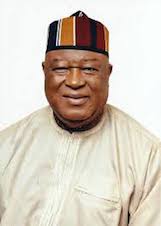People
Hagher: A Statesman and His Birthday Message
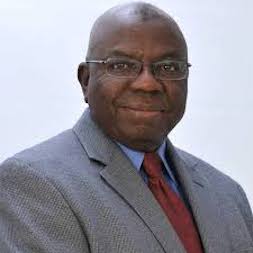
Today is June 25th. I have been celebrating since Sunday, June 21st. My friends, grandchildren, children, and other fathers and mothers, the world-over, held me up to an unforgettable Father’s Day celebration.
But that is not all. My friends, we all deserve to celebrate.
To be alive during these perilous times when death is lurking and stalking to ambush and obliterate us all in the world is celebratory. We have become the narrators of the times of Corona Virus just like those present in their nineties and hundreds. They tell us of the pandemics of their time; the Spanish flu of 1918, that infected 500 million people and killed an estimated 20 to 50 million people worldwide.But that is not all.
We live in a special time in history. Not just special but extraordinary times. Globalization and technology have made small happenings in remote parts of the world to assume the gargantuan center stage globally.Everyone everywhere is now more vulnerable to the actions of anyone anywhere. Never has the whole world lived in recurring moments of global mutuality as we do now. While the COVID 19 has killed people irrespective of race, nationality, and economic status; it has also opened our eyes to see that oppression anywhere on earth is oppression everywhere and diminishes our common humanity.
Oppression is being resisted in uncommon ways. In the United States where I am Sheltering in Place with Nancy my wife, the people have risen to say “NO” to systemic racism; after the public lynching of a black adult George Floyd, by a white supremacist police officer.
Never before have both whites and the black together risen up in such numbers and force to denounce and condemn the systemic racism against the black American citizens. This racism has kept the black of the United States perpetually backward and consigned them to a backwater precarious existence while white society wallows in growing wealth. It is more amazing that the millions of white, black, and brown demonstrators went out on the streets to protest that black lives mattered while putting their own lives at risk from the Corona Virus and white supremacist backlash.
These are memorable times. They will be remembered even in the 22nd Century when most of us alive today would be lying peacefully in our graves. Our grandchildren and their grandchildren will probably find through research that we lived in these memorable times.
My own celebration is a co-mingling of surprise and gratitude. Surprise of how the single year 2020; can change the course of human history and gratitude of how God preserved me to be a writer in the last quarter of the 19th Century and now I also function as writer, and documentarist of the 21st Century.
HOW I SURVIVED THREE PANDEMICS IN NIGERIA.
I have more reasons to celebrate this birthday. I have survived three pandemics in my life and I am looking at the strong reality to survive this ubiquitous menace called COVID 19? In 1958, While I was in primary school a long time ago; when Nigeria was under colonial rule my school village Zaki-Biam woke up to horrendous deaths due to the smallpox pandemic. My Uncle’s wife Kuzuwa Kpurkpur was one of the first attack victims of the virus which spread in the air like COVID19. I lived with my uncle and his wife taught me entrepreneurship as a young schoolboy. I sold savory beans cakes she fried.
My aunty did not die. And we were not infected. The colonial office in Kaduna immediately sent the vaccine for all of the community.
My aunt survived because of the tremendous love her husband had for her. She was promptly isolated in a remote hut far away from everybody including us the children. But her husband defied death.
He was there with her both day and night cooking and caring for her blistering rashes, high fever, and oozing skin sores. To the glory of God, Aunty Kuzuwa is alive at the age of 93, as fit as a fiddle. Her name Kuzuaai means death has met its match. I survived smallpox that had killed over 300 million people worldwide. It was only eradicated in 1980. So allow me to celebrate in the time of COVID 19.
I suffered a second attack. My second pandemic attack arrived two years after I developed high fever just like other people who were dying in their droves without reason. There was no testing and no registration of deaths.
Many older people who died were attributed to witchcraft until the staff and students of ABU and other universities in Nigeria started to demonstrate against France.
As it turned out, almighty France had detonated its first nuclear bomb in February 1960 in Algeria during that country’s struggle for Independence. Nigeria was still a British Colony and I was neither a Nigerian citizen nor a British citizen. I was a “British Protected Person” in status.
I was in primary four. And the mission dispensary helped me survive the French bomb flu which had carried radioactive emissions through the harmattan winds to cause fatalities in British Colonial Nigeria seven months to independence.
In 1998 while serving as Nigeria’s Minister of State of Health, Nigeria was attacked by the HIV/ AIDS pandemic and too many lives were lost.
The international community refused to help Nigeria and even when I invited the American ambassador to my office to express the displeasure of government and pleaded for their assistance. He declined. Nigeria was an international pariah then. To make my case dire; My home State Benue had one of the highest infections and deaths. I had to resort to desperate measures in innovation for curtailment.
I brought medical doctors and theatre professionals to create public awareness. I had to personally join the Kwagh-hir performers in Benue to an effective mass education when the people were losing hope and fatalistically making witchcraft claims and blaming women for the spread.
Generous offers from Julius Berger of condoms were accepted and distributed and we co-operated with the states to engage more actively to help contain the spread throughout the country through mass awareness and education about HIV/AIDS.
As a minister, I was horrified to see people dying in droves due to depression of stigma, discrimination, and stereotyping. We needed to offer a more humane and scientific way of presenting HIV/AIDS victims to be accepted by their communities to become care-givers. My personal smallpox experience of homestead care became a national norm.
The highly knowledgeable medical staff at the ministry followed me to Ogobia in Benue State where a homestead policy was effective in enhancing care for the victims.
Today it is difficult for us to imagine how HIV/AIDS ravaged the country. Nigeria survived because the government was upfront, innovative, open, and inclusive.
WHAT THE FUTURE HOLDS.
I also celebrate my future today. I am facing the rest of my life with calm resolve. I will celebrate life. I will allow God to take charge of my life as I had always done. I will celebrate my wife of forty-five years every day, as part of my life. Together with Nancy, we have faced life and the world hand-in-hand. She gave me strength, courage, patience, and humor. We faced our
vulnerabilities every day with faith, hope, and love. The presence of God’s potency in the unpredictable trajectories of our life has been palpable.
But we are not a singularity family. We are a large family of teaming scores of sons and daughters and grandchildren in Nigeria and across the world even though we live in an empty nest.
My life is becoming busier. I have this month joined the family of US novelists fighting racism and imperialism through my forthcoming novel “ The conquest of Azenga.”
Racism and Tribalism are dangerous myths. They are nonsensical beliefs and doctrines claiming that inherent differences in racial and ethnic groups determine superiority and the right to dominate and oppress other races or tribes considered as inferior.
My task is to seek along with other writers to dismantle systemic racism in the US and systemic tribalism in Africa of which Nigeria is the worst offender.
I have only my written word as a weapon. My prayer is that God will lead the fight for justice and I will merely be a translator of his will through my inescapable and inevitable complex reality.
We are all living in portentous times. Advances in technology, science, and medicine have accelerated the rate of change. Unfortunately, this acceleration is not matched by the human ability to adapt.
In Africa, the inability of our people to adapt is costing the life of the citizens chafing under the weight of nonsensical and outdated demagoguery.
The rest of the world is not just changing rapidly it is being dramatically reshaped, and starting to operate differently. Africa’s leadership, institutions, societies, and ethical choices need to cope, adapt, and be reshaped. This is a task to which all of you my friends are called to undertake.
I finally call out the intellectuals among you. And you are all intellectuals because you are on this platform with me. The 20th century is the Century of the intellectual.
The whole world is suffering due to ignorance that is calling the shots everywhere. Let us build networks of new enlightenment for global social justice that can tear down the walls and monuments of racism, bigotry, and tribalism.
We must all join hands together and march onwards. To do less is to allow evil to seize the momentum. As the philosopher Albert Camus famously warned:
“ The Evil that is in the world always comes of ignorance. And good intentions may do as much harm as malevolence if they lack understanding.”
So I drink a toast to all of you my friends for making this date so memorable.
IYORWUESE HAGHER
Presidential Aspirant, Nigeria, 2019.
June 25, 2020.
FEATURES
Miss Valdeen N. Pierre Honored with Humanitarian Award at the 2025 National Humanitarian Summit
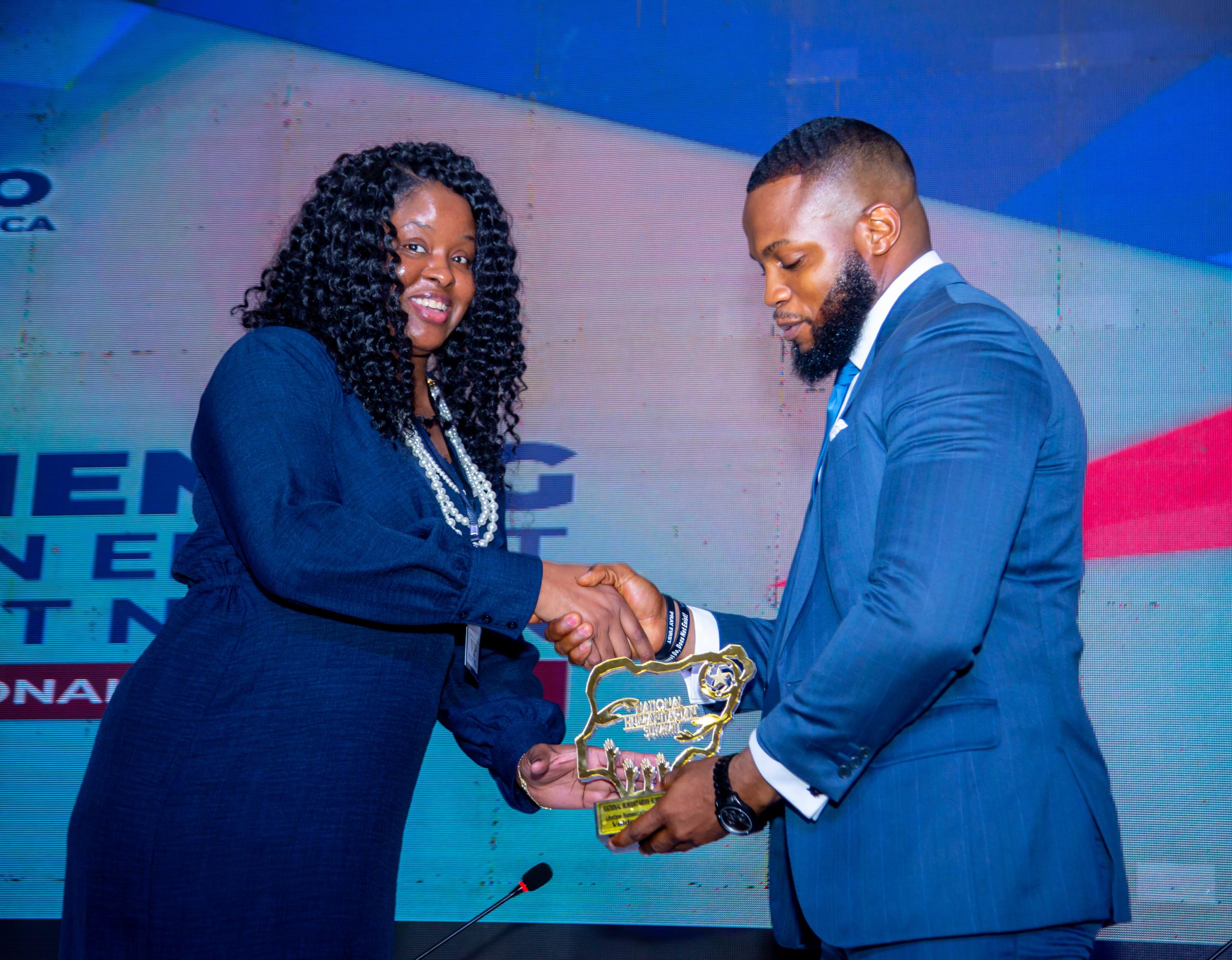
In a remarkable celebration of humanitarian service and strategic collaboration, Miss Valdeen Pierre , Country Director – United State ; A New Thing International foundation ; was honored with the Humanitarian Award at the prestigious National Humanitarian Summit 2025, held at the Shehu Musa Yar’Adua Centre, Abuja.
The award recognizes Miss Pierre’s and other humanitarian leaders unwavering commitment to humanitarian causes, particularly her collaboration with A New Thing International Foundation on the SOBE Project (School Outreach for Better Education) across Sokoto, Kebbi, Plateau, Niger States and the FCT.
Her efforts have significantly contributed to improving access to quality education and raising awareness about social vices among schoolchildren in underserved regions.The summit drew an esteemed audience comprising multiple stakeholders across the humanitarian value chain, including the Minister of Youth Development, Minister of Humanitarian Affairs, Special Assistant to the President on Humanitarian Affairs, the First Lady of Kwara State, First Lady of Zamfara State, representatives of United Nations Humanitarian Agencies, NGOs, INGOs, and other key players in the humanitarian sector.
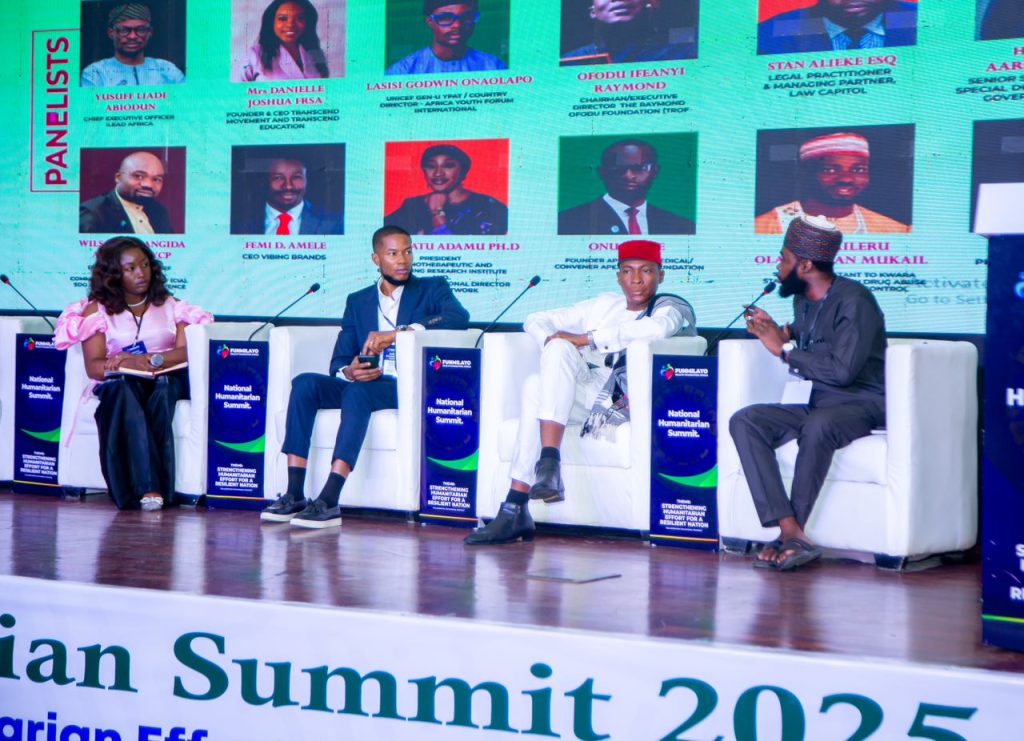
The event featured a vibrant mix of panel discussions, keynote addresses, and the unveiling of strategic development plans aimed at strengthening collaborative impact across Nigeria and beyond.
In his vote of thanks, Ambassador Kenneth Anetor, the Executive Director of A New Thing International Foundation and Chairman of the Planning Committee, delivered a passionate closing speech. He commended the honorees and stakeholders, issuing a clarion call for deeper collaboration and renewed commitment to advancing strategic organizational development goals. His rousing remarks inspired attendees to rise to the moment and forge stronger partnerships for sustainable impact.
Ambassador Anetor also extended profound appreciation to the summit’s convener, Ambassador Michael Timothy, of the Funmilayo Health Foundation Africa, for the opportunity to serve as Chairman of the Planning Committee, and for creating a platform that celebrates excellence in service and drives transformative conversations in humanitarian work.
The National Humanitarian Summit 2025 stands as a milestone in Nigeria’s journey toward inclusive, people-centered development, with Miss Valdeen Pierre’s recognition serving as a beacon of hope and an example of the power of global partnership in humanitarian efforts.
For media inquiries , information, or donations please contact:
Email: anewthingworldwide@gmail.com
Phone: +2347037474611
Website: www.antworldwide@gmail.com
OPINION
Psychological Appeal to Ex Emir Aminu Ado Bayero
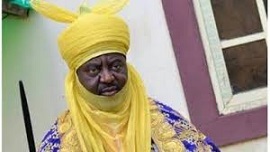
By John Egbeazien Oshodi
The controversy began with the reinstatement of Muhammadu Sanusi II, as Emir by Governor Abba Yusuf, following the repeal of a law that had previously led to Sanusi’s deposition. Amidst these legal proceedings, your return to Kano and the subsequent tensions highlight the complexities of political and traditional leadership dynamics.
Dear Ex Emir Bayero,
In the midst of the current political and legal turmoil, it is essential to pause and reflect on the principles of honor, integrity, and wisdom that have long been associated with your esteemed lineage.
As a leader revered for your adherence to rules and traditions, you have the unique opportunity to exemplify the highest standards of leadership in these challenging times. I write to you as a native Nigerian, deeply invested in the peace and prosperity of our great nation. We have never met, and I have no allegiance to any name here.A Kano state high court has issued an order restraining you from presenting yourself as the Emir of Kano pending the determination of the ongoing suit. This legal battle is not just a matter of personal contention but a significant event that impacts the peace and stability of the entire Kano region. The court’s mandate, along with the police securing the Nasarawa palace, underscores the gravity of the situation and the need for compliance with judicial rulings.
The controversy began with the reinstatement of Muhammadu Sanusi II, as Emir by Governor Abba Yusuf, following the repeal of a law that had previously led to Sanusi’s deposition. Amidst these legal proceedings, your return to Kano and the subsequent tensions highlight the complexities of political and traditional leadership dynamics.
It is reported that former governor and APC chairman Abdullahi Umar Ganduje, who played a role in your initial appointment, has been utilizing various interests and means, including a controversial ex parte order issued by Justice Mohammed Liman from the United States, to support your position. However, this action contradicts Nigerian judiciary policies and has raised significant concerns about federal overreach and the potential misuse of power.
As a respected figure, the media has consistently described you as a man of honor and a leader who follows rules. This is a moment to reaffirm these qualities. By acting with integrity and wisdom, you can set a powerful example for your followers and the broader community. It is crucial to recognize that this matter falls within the jurisdiction of the state government and judiciary. The involvement of federal forces, including the military and police, further complicates the situation and risks escalating tensions.
Consider the stance of Alhaji Aliyu Ibrahim Abdulkadir, the former Emir of Gaya, who has accepted his removal as an act of God and expressed no intention to challenge the decision in court. His dignified acceptance serves as a powerful testament to the strength of character and resilience. By choosing a similar path, you can help ease the current tensions and contribute to the restoration of peace and stability in Kano.
Governor Yusuf has been advised by this writer in an earlier publication that strategic psychological approaches be employed in dealing with the situation. By gradually diminishing the resources and authority at your disposal, it becomes clear that the influence of external political figures like Ganduje cannot override the unified resolve of the state. The reality of diminishing power, finances, and resources will inevitably set in, and it is wise to acknowledge this shift and act accordingly.
Governor Yusuf has appealed to President Tinubu to relocate you from Kano to mitigate the threat to peace. This plea underscores the need for a resolution that prioritizes the well-being of the people of Kano over political or personal interests. You do not need to wait for Tinubu; your cooperation in this regard would not only demonstrate your commitment to peace but also reinforce the respect and admiration that the public holds for you.
Ex Emir Bayero, this is a pivotal moment that calls for a leader of your stature to rise above the fray and act in the best interests of the community. You are caught between two warring political figures, Yusuf and Ganduje. By listening to the voice of reason and adhering to the principles of justice and honor, you can help navigate this crisis towards a peaceful resolution. Your actions today will not only define your legacy but also set a precedent for future generations.
The now troubled situation, exacerbated by political heavyweights like Ganduje, stands powerless against the unified resolve of the people and the enduring spirit of the state. The recurrent misuse of federal authority, including judicial bias, coercive policing, and military intervention, cannot sustain one individual’s ambitions against the democratic will of the entire state.
By aligning with the people and upholding democratic ideals, you can transcend political discord and advocate for enduring principles of fairness and righteousness. The people of Kano will honor your legacy if you transcend political turmoil and exemplify leadership grounded in justice and equity.
May wisdom and peace guide your decisions. May Allah bless you now and in the future Sincerely.
Professor John Egbeazien Oshodi, born in Uromi, Edo State, Nigeria, is an American-based police and prison scientist, forensic psychologist, public policy psychologist, and legal psychologist. He’s a government advisor on forensic-clinical psychological services in the USA and the founder of the Dr. John Egbeazien Oshodi Foundation for Psychological Health. With a significant role in introducing forensic psychology to Nigeria through N.U.C. and Nasarawa State University, he’s also a former Secretary-General of the Nigeria Psychological Association. He’s taught at esteemed institutions like Florida Memorial University, Florida International University, Nova Southeastern University, and more, and is currently an online faculty member at Weldios University, Nexus International University, and Walden University.
People
UK Life: Where Love Is Hard And Sex Is Easy

Virtually every week, a Nigerian abroad comes out on social media to lament the scarcity of partners for meaningful romantic relationships. In recent times, we have had a more frequent outcry from women. Not just average women but beautiful and classy ones. What do you think is the problem? Are the men going extinct? Let’s dive into this topic from a UK experience.
Have you ever felt lonely despite being in a very crowded space? It is a weird feeling.
Everybody wants to help and at the same time, nobody wants to help. This is what dating in the United Kingdom seems like.Here are some reasons why it might be challenging finding a partner abroad:
(1) Culture shock:
The United Kingdom is a multicultural society.
You get to meet Indians, Africans, Chinese, Pakistanis, Europeans, and generally people from different works of life. Their belief systems, behaviours, and different approach to issues are different. People naturally avoid what they find strange and this could affect romantic relationships.(2) Ethnic Division:
In most cities in the UK, people don’t mix especially outside work. The people have doctorate degrees in ‘minding their businesses’. The Chinese roll with the Chinese, Indians to Indians and Nigerians roll with their own. People just feel more comfortable with their own.
(3) Too fast, too busy:
Life in the UK is just too busy and fast especially if you are a fresh immigrant. You might have to deal with the rigours of work and school as they run concurrently. These two engagements might make a whole year look like 6 months. Oftentimes, romantic relationships take a secondary position. Some people would pick shifts over romantic dates because that is what pays the bills.
(4) Historical concerns:
Before the tier 4 visas became popular, most Africans saw the locals as keys to their stay in the country. Relationships have always been a means to an end in the UK. A selfish end so to speak. The nefarious activities of internet fraudsters have always complicated interracial relationships. For this reason, most tier 4 visa holders or citizens are wary of new entrants.
A lady who holds a British passport or Tier 2 visa might doubt the love interest of a suitor holding a tourist or student visa. There is widespread distrust in the country and nobody wants to be used as a ladder to step up. Consequently, some potential good men slip under the radar.
(5) Stereotype:
Nigerians don’t have the best reputation in the UK. This is related to the previous point made. This has led to hasty generalisation and unwarranted assumptions. On dating sites/apps, some people will not talk to you because you are a Nigerian. This might be due to an adverse experience or an ordeal told by a friend, or family member about their experience with a Nigerian.
(6) Ego:
The UK has so many successful women. Most of them become big-headed as career success and financial breakthroughs come. They tend to desire men in or above their social/economic class. But African men in their supposed class fear women like them because of issues around control. Men don’t want to travel on a ship with two captains. Before you know it, one woman is still single at 40 despite her beauty and achievements.
(7) Small population of Nigerians:
Despite the Japa Syndrome, Nigerians are in the minority in the UK. Out of a population of over 67 million people, Nigerians account for just 0.5% which is 271,390 in England and Wales. Most Nigerians come to the UK married. These two factors limit the available options on who to date. Even if you want to consider someone outside your ethnic background, they might not be interested in you.
(8) Racism:
Due to the sensitivity of this topic, I will not dwell too much on it. It has been criminalized, but it is still what it is. Coloured people are not really in demand except for people who just want to briefly explore. Call that jungle fever!
(9) Lack of intentional efforts:
In the UK, you have to consciously work towards getting married. Attend social gatherings, meet people, shoot your shots, join dating apps, join churches, approach people for relationship referrals, and never give up when you hear a ‘no’. You might just be lucky the next time you try.
(10) Marriage isn’t a big deal:
People in the UK are not so big on marriage compared to their counterparts in Africa. I have a colleague who has been engaged for years; nothing is happening and nobody is under pressure. In Nigeria, people will ask questions like “Are you Froddo in the ‘Lord of the Rings’?”
Generally, people just live together as partners for years and have kids together without being married. An African might frown at this on cultural and religious grounds.
(10a) Accent:
Relationships start with active and good communication. In the UK, some accents are just too complicated to understand. This makes verbal communication stressful. Most people become easily uninterested in those that don’t speak like them.
(10b) Indiscriminate s*x:
Due to loneliness and cold weather, most people just want to have fun with no strings attached. They want to experience that crazy feeling of intimacy for the moment. Since society doesn’t attach importance to ‘body counts’, people jump on as many beds as possible. This is paramount amongst single parents. Single mothers just want to drink alcohol on Friday nights and have sx without entanglements. They tend to enjoy their sxual freedom and conclude that serious relationships might take that away. If care isn’t taken, a woman might wake up to realize that she has had more sxual partners than a full-time prostitute at the end of the year. Sx is easy, love is hard.
These are some of the reasons I have been able to come up with. I’m pretty sure they could be extended.
Conclusion
It is possible to find love in the UK, although it is tricky. The key is being very intentional about the love search. From my personal research and experience, I believe the most effective way is through referrals. When you meet nice people, tell them to introduce you to their like-minded single friends or family members. Make your intentions clear. This is equivalent to getting references for a job application. Additionally, expand your social circles, and join African churches with huge members. Some pastors take it upon themselves to matchmake people and it works. Dating apps might not be the most ideal place to seek a meaningful relationship, but we never say never.





